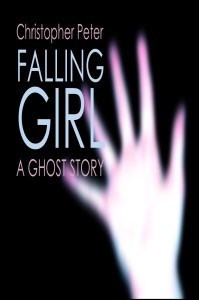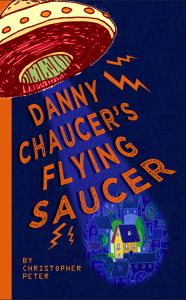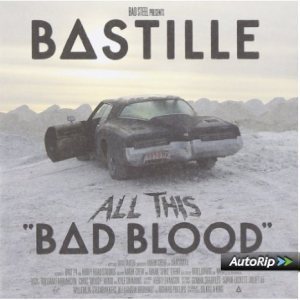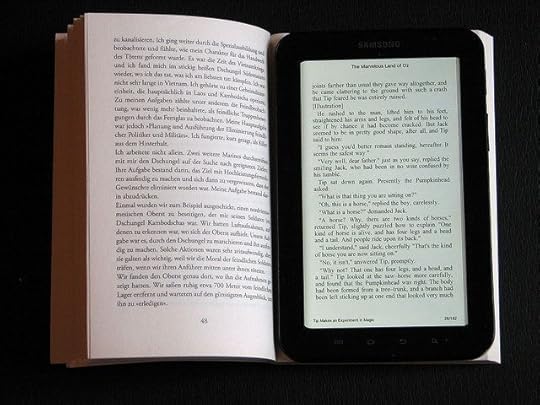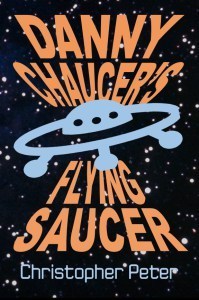Christopher Peter's Blog, page 5
May 27, 2015
The fall of Falling Girl
I reached a momentous decision today. I’ve basically unpublished my first novel, Falling Girl from Amazon. Why?
Well, there were a number of reasons really. If you believe (as I do) that your writing gets better with time and practice, then it follows that your earliest work may not be as good as your more recent output. I’ve heard it said that a first novel should be seen as a dry run, a place to make all your mistakes (or even more than usual anyway), and should remain locked in a desk drawer (literally or digitally) rather than published.
Which may not always be true obviously. But I was re-reading the prologue and first chapter earlier today and … I don’t know. I think there’s much there that’s positive. I just think that if I was writing it now, I’d do it differently. I believe I’d lose the prologue for a start. It’s quite different from the rest of the book and has a different POV. I’d say it’s a reasonable piece of writing in itself but, bottom line, the book doesn’t really need it.
There’s another reason. Since my first two books, which were both YA, I’ve switched to middle grade with Danny Chaucer’s Flying Saucer. Maybe that only accentuates the difference in my writing I see between then and now.
And besides, Falling Girl is available for free on this site now anyway, and has been for some time. It does occur to me that, if I don’t believe it’s a good advertisement for my writing whether I should make it available in any form at all, even for free.
But I’m not ashamed of it. It was my first novel, an achievement I remain proud of, and I’ll always have a special affection for it. I worked very hard, paying for a professional critique and redrafting many times, including one fairly significant revision several months after the original publication. Many people have said nice things about it, and I’m fairly sure most of them were telling the truth. It’s not a bad book. I still believe it’s a pretty good one in fact. It’s more that I’ve moved on and I don’t think it’s a quite good enough reflection of where I am and where I want to go.
And no-one was buying it anyway. Would I still withdraw it if it was selling well? Probably not, if I’m honest. But it wasn’t, so that’s a moot point really.
My second novel, BASIC Boy, is still on Amazon as a Kindle edition, though the paperback is no longer available. I do think that’s a better book and I’m more comfortable with keeping it on sale.
Have you published a book and then withdrawn it from sale, or thought about doing so?


May 11, 2015
How carefully do you proofread your blog posts?
OK, not the most thrilling of questions, but I’m interested nonetheless. I’m always a little conflicted over this. One part of me thinks: look, I’m a writer, writing is my craft, I should aim to make everything I produce of the highest possible quality, whether it’s a novel, a short story or a 500-word post.
But then the demon (or is it an angel?) on my other shoulder whispers: nah, don’t stress so much. It’s a blog. It’s supposed to be spontaneous, human, real. It’s supposed to convey something of your personality (though I’m not sure what some of my posts reveal about that). What does the odd typo, cliché or misplaced apostrophe really matter? Most people won’t judge you for the odd mistake.
In the end I guess I lean more towards the first point of view, but take something from the second too. I do think it shows some respect to readers to take a least reasonable care. I redraft my posts at least a couple of times, then do a last scan/proofread before uploading. And after all, I am supposed to be in the habit of spotting and correcting errors. If I produce a sprawling, incoherent splurge of a post, what does that say about me and my attitude to my work?
On the other hand, a blog post isn’t the final draft a book before publication, nor a competition entry, nor a query letter to an agent. It doesn’t really hurt if it’s not 100% perfect, and I don’t really believe most people expect it to be. Therefore I don’t proofread everything to the nth degree. (Though I am anal about apostrophes – can’t stand it if they’re wrong.)
However if I spot an error after posting, I usually can’t bear to let it be. A recent example, in my post Your pulse in the pages: music to inspire your writing, I originally wrote that:
… good fiction can infer of kind of immortality upon its subjects.
As soon as the post went live, that word infer leapt out and poked me in the eye. It was of course the wrong word – it should have been confer. (Or at least I’m fairly sure it should be – now I’m starting to doubt myself, so if anyone wants to correct me, feel free!) So I changed it (and then encountered WordPress’s occasional annoying habit of mucking up the formatting when you try to edit posts, but that’s another story). A touch obsessive perhaps, but it wasn’t correct and, knowing that, I wanted it to be right.
P.S. I absolutely know I will have made at least one error in this post. It’s just inevitable.


May 4, 2015
A good day to publish a sci-fi book?
Well, Star Wars Day seemed a good a day as any. Danny Chaucer’s Flying Saucer is now available on Amazon (links: UK, US), initially as a Kindle edition only, hopefully to gain a few reviews and help with the marketing. The paperback edition, along with availability in other channels including the iBook Store, will follow in the coming weeks.
So … after all those drafts, all that re-writing, my third novel has finally seen the light of day. It’s always a special moment. Not that I will pause long to savour it – there’s still so much to do, not least the second book in the series which is currently still stuck in first draft. And the third, not yet beyond outline form. And … a writer’s work is never done. Sometimes I wonder what I’ve gotten myself into – but it’s worth it.


May 1, 2015
Your pulse in the pages: music to inspire your writing
Do you find it helpful to listen to music whilst writing? I know some people do I tend not to as it doesn’t always help me concentrate, unless I’m doing something particularly monotonous that only requires half my brain. Particularly if the song has lyrics, I find myself listening to them rather than focussing all my mental energy on trying to squeeze something creative from my reluctant brain.
However I’ve recently come across a track with very interesting lyrics. It’s called Poet, from CD2 of Bastille’s double album All This Bad Blood. (I’ve got into Bastille big time recently and am in grave danger of wearing out the CD.) The song is about a slightly obsessive writer and the object of his affections. Take a look at the excerpt below:
I have written you down Now you will live forever And all the world will read you And you will live forever In eyes not yet created On tongues that are not born I have written you down Now you will live forever … Your body lies upon the sheet, Of paper and words so sweet. I can’t say the words, so I wrote you into my verse. Now you’ll live through the ages, I can feel your pulse in the pages.
OK, on one level it’s a bit creepy (the first lines of the song, not reproduced above, are: Obsession it takes control / Obsession it eats me whole … I prefer to believe this is a sweet shy guy. It would spoil the poetic ambience somewhat if he turned out to be a serial killer.
But as a hymn to the power of the written word, it’s pretty good: In eyes not yet created / On tongues that are not born / I have written you down / Now you will live forever … a reflection on the fact that good fiction can confer of kind of immortality upon its subjects.
And, even better: Now you’ll live through the ages / I can feel your pulse in the pages … as a writer I want my characters to live and breathe, to be real. To ‘jump off the page’ as the saying goes. Can you feel their pulse in the pages? If you can write a character like that, you‘ve created something truly special.


April 29, 2015
Why I’ve decided on hybrid publishing
I’ve been neglecting this blog big time recently, being far too busy with life in general but more specifically with putting the finishing touches to Danny Chaucer’s Flying Saucer and completing the first draft of its sequel. But I’m resolved to blog more regularly from now on. Writing’s a solitary business at times and there’s such a great community on WordPress that’s well worth keeping in touch with.
Anyway – back to the main point of this post. When I posted my writing resolutions for 2015, high on the list (after completing DCFS) was to finally decide on whether to continue down the self-publishing route or to hurl myself into the purgatory of query letters, agents and slush piles hoping to win one of those vanishingly rare traditional publishing lottery tickets.
Both options have their pros and cons of course. For me, the biggest problem with self-publishing is that your book will almost certainly be lost in the crowd. And traditional / conventional publishing, despite the unbelievably high bar confronting prospective new entrants (unless you happen to be a You Tube sensation or random celebrity who may or may not be able to string three words together), is perhaps not a great deal better. Put bluntly, most books don’t sell very well, however they’re published. There are exceptions of course, but they represent a tiny percentage of the tidal wave of new titles published every year.
The fact that I’ve sold very few books so far hasn’t stopped me, mainly because I love writing for its own sake. However, I love it so much that I’d like to spend a lot more time doing it, and that’s not really possible unless I start getting a decent income from it.
So is there a middle way? Some way to improve your chances of success – to help you make your books as professional as possible and to have more chance of selling it? There is much talk of hybrid or partner publishing, and these terms tend to mean different things to different people. All I can tell you about is what I’ve decided to do, and why.
DCFS will be published by a company called Albury Books. They are not a conventional publisher but neither do they publish anything and everything that comes their way. DCFS had to be accepted in order to carry their imprint. I have no doubt that their selection criteria were nowhere near as rigorous as a conventional publisher’s has to be when confronted with a tottering pile of hundreds of unsolicited manuscripts and a budget that probably allows them to take on perhaps one of them. But the fact that Albury do have minimum standards was reassuring.
I also liked their website, the fact that they have a children’s book programme, and the appearance of the books they were selling. The covers looked quite professional, for instance. That is not the case with all hybrid publishers’ websites I’ve seen, some of which looked quite amateurish and were jam-packed with covers that absolutely screamed ‘self-published!’ and not in a good way.
I know what you might be thinking at this point. I know because I’d probably be thinking it myself: isn’t hybrid just a polite word for vanity? Ah yes, the dreaded vanity press, exploiting authors’ dreams, taking their money for over-priced services and giving poor value in return. Have I fallen into that trap?
Well, for me, paid publishing services are not a dirty word (or words) necessarily. Design, editing, distribution, marketing … these things, especially if done properly, all cost time and money. Unless you’re one of the lucky few who secures a conventional publishing deal, they won’t come for free (and even then, much is still expected of the author, especially on the marketing side). Sure, a self-publishing author can do much or even all of it themselves – but to what standard, and how successfully? Let’s be honest. Amazon is full of books that aren’t very good, or have lousy covers, or sell few or no copies. There are also many that are very good, look amazing and/or sell in decent quantities, but they are the exception especially on the sales.
So I have concluded that if I want to do things better, going it alone is not the best option. I need some help, and yes that’s going to cost me something. To some extent, how much it costs is up to me. Albury do not sell fixed-price packages or require you to buy services you don’t need. I have got the cover designed through them (see above) – they were OK with my own design but I decided to go professional this time, and I’m pleased with the result. They did require, as a condition of acceptance for publication, that a copy-edit of the text was done by a specialist children’s editor – but they did not insist that this was sourced through them. I could have gone out and found my own copy-editor. (The edit was a good thing, by the way – I’ve never had one before, and I’m certain the book is better for it.)
There are some things I’m still doing myself, and therefore not paying for, because I’m confident I can do them to a good standard. This includes the text layout and the set-up on Amazon. Albury will be handling the set-up in other distribution channels, on their own website and in POD. The standard of the POD printing of their books, by the way, is definitely a cut above what I’ve experienced with Amazon’s, and therefore I won’t be setting up this book in Create Space.
I have to sign a contract, but I get to keep a high percentage of the royalties. The percentage is higher than Amazon’s and certainly miles better than those of a typical conventional publishing contract.
But of course, a high percentage of diddly squat is still diddly squat. The idea is to sell some books. Which brings me on to marketing and publicity services. These are available through Albury but they cost, and I’m still evaluating the options here. Two things I know: there are no guarantees when it comes to sales, and even if I pay for some services the onus is still on me. If I don’t believe in the book, I can’t expect anyone else to. I’ll post more about the marketing another time.
If you have any views or comments on any of this, I’d be pleased to hear them. Thanks.


March 23, 2015
Tummies, helicopters, and why I’m a proud dad
The other day my six-year-old son William proved he’s a real chip of the old block, by spontaneously coming up with a flash fiction piece. May I proudly present (spell-checked by me but otherwise all his own work), The Super Tummy:
The Super Tummy
Once upon a time, there was a super tummy. It could fly and scare things off. It was like the Tardis. People went in it to save their lives so it was good and it made many people happy.
He did it for years and years, and one day the King went in him and he was happy. They had fun together and a dalek came but the tummy saved them and they lived happily ever after.
Kind of surreal, right? I reckon there’s some deep metaphysical meaning in this piece, though superficially it might read like an especially deranged example of Doctor Who fan fiction.
But then, a couple of days later, he got together in with his ten-year-old brother George and produced the following collaboration, The Weird Helicopter. From this piece I learnt three things: first, George has been learning about adjectives and adverbs at school and encouraged to include as many as possible; second, William’s creative influence remains evident (he loves helicopters); and third, George was still mad at me after an earlier conversation (see if you can guess what that was about):
The Weird Helicopter
There once was a light helicopter that liked buzzing around rapidly. Then he would lovingly play with his friends (Ben, Leon & Sophie). However, one day when he was flying through the interesting forest to meet his wonderful friends, his annoying dad stopped him and he did his homework.
So my kids are writers! Well apart from my twelve-year-old daughter, who’s convinced that everything I do is embarrassing. Still, two out of three’s not bad.

February 24, 2015
First draft blues
The trouble with dishing out advice is that you kind of feel you should practice what you preach. If you’ve visited this blog before you may have read my exhortation to ‘whack out’ the first draft of a book. It won’t be great, in fact it will probably be a mess, but you’ve got to start somewhere and that first draft just has to get written.
Well I still believe that, but I’m currently about halfway (I think) through the first draft of the sequel to Danny Chaucer’s Flying Saucer. I’m planning a three-book (initially) series, and I’ve started work on the second book even though the first isn’t yet finished. (The first book has gone through four drafts, but I’m now getting more feedback and going for a fifth, figuring that the book can only get better as a result, I hope.)
And it’s been a bit of a struggle. I love writing but at times it’s a bit more love–hate. I find the first draft the toughest one. Sure, re-drafting and editing is hard work too, but it’s somehow easier for me when there’s something to work with already there, even if some of the changes are pretty extensive and often involve adding whole new chunks as well as excising others.
Perhaps that’s the point: the first draft is the rawest, purest act of creation, of creating something from nothing; and that process of wresting words, sentences, paragraphs, dialogue, plots, characters, from brain to screen can seem painfully difficult at times. It always seems to demand more of me than any other part of the writing process.
It also takes persistence, especially when you can clearly see the flaws in what you’re producing. Because although I know the first draft is inevitably going to fall short, that knowledge makes it harder to plough on. At least in the re-drafting/editing I can see how the book is improving, and it’s immensely satisfying to see that happening. But when I’ve spent an hour hammering down a chunk of prose for the first time, and then look back and realise it’s a bit ‘meh’, that can be more than a little de-motivating.
This can lead me to break my own rules about splurging it all out and worrying about quality in the second draft. I do find myself back-tracking a bit at times and making some minor alterations, as well as fixing some of the more annoying typos. (If I type ‘starts’ instead of ‘stars’, or ‘this’ instead of ‘his’, many more times I swear I may cut my hands off.) But then rules should sometimes be broken. I don’t see the point in writing total garbage. (Partial garbage, sure.) My first drafts are always going to be somewhat dodgy, because I know if I tried to fix everything at once I’d never get anywhere, but I need to see something good in what I’m producing.
What makes it even worse for me is that the Danny Chaucer books, being children’s / middle-grade level, aren’t very long. The first book is around 30,000 words, and for the second I’m aiming for about the same. How long can it take to write a 30,000-word book? I’ve written longer (BASIC Boy is twice that length), and adult novels are typically much longer. I really admire anyone who writes a decent 80–100,000 word novel. That takes some effort.
But I’m forging ahead, slowly but surely – though slower than I’d like and not entirely sure of myself. Don’t get me wrong – I wouldn’t keep going with something I completely hate. I’ve chosen to write, and I’ve chosen to write this book at this time, so I shouldn’t keep belly-aching about it. No-one’s holding a gun to my head. Actually that would be pretty motivating, but in its absence I keep reminding myself of a few things when it comes to first drafts, to help me keep going:
It’s just got to be done. I bet a lot of would-be writers fall at this first hurdle, and that’s a shame.
All writers’ first drafts are dodgy, even the really famous and successful ones. It’s part of the process.
If you can already see some of the faults, then that’s great. You can’t fix them if you can’t see them. (And if you can’t see them, don’t worry, you will – or otherwise someone else will show you if you ask.)
Find you own method and pace. You might be a ‘slap down the words as quickly as possible and fix the problems later’ type; or need to spend more time to get more right first time. Both are fine if they work for you. And your approach might evolve over time, or vary between projects. Just don’t get too bogged down – get it finished.
Finally, remember that you’ve got plenty of time, and subsequent drafts, to improve the work, And there will be plenty of good to improve, not just faults to rectify. The first draft is the necessary – if often difficult – first step along the road to a book you can be proud of.
So with the above in mind, I should probably stop writing this and go back to writing DCFS2.

February 12, 2015
A writing quote that made me smile …
… from Erin Kelly’s latest, The Ties that Bind (and no it’s nothing to do with Fifty Shades of Grey and you’ve got a dirty mind). Great book (she’s one of my favourite authors) and I loved this quote:
Luke’s parents had not blinked when he had told them he was gay, but he wasn’t sure they had ever quite recovered from the blow of learning that their son was a writer.
You can get all sorts of reactions when you tell people you’re a writer, and they’re not always predictable or positive. (The reactions that is, not the writers.)

January 9, 2015
More on Hybrid Publishers: An Innovation to Success?
Very interesting look at so-called ‘hybrid publishers’, comparing and contrasting with ‘traditional’ and self publishing. The linked Forbes article is also worth a read. Now that I’m nearing the end of Danny Chaucer’s Flying Saucer, the question of how to publish it is a major preoccupation of mine right now …
 Originally posted on Publishing Insights:
Originally posted on Publishing Insights:
David Vinjamuri presents his view in the article How Hybrid Publishers Innovate To Succeed on Forbes. He introduces the rise of hybrid publishing, who is considered to be a combination of both traditional publishers and independent authors who are digitally skilled. It is a new and controversial model of publishing in the industry, but Vinjamuri outlines three characteristics of successful hybrid publishers, including offering small advances, operating on voluntary contributors, and speeding up on product development cycle. He concludes that “agility” is the biggest advantage of hybrid publishers in their competition with traditional publishing houses and self publishers.
I agree with Vinjamuri that a fast response to the market — sometimes achieved through the use of social media platforms — can often get you in the upper hand of sales, which is one of the biggest challenges for traditional publishers, who may get stuck in the slow motion of product development cycle…
View original 252 more words

January 5, 2015
DCFS: Sample now available – and my close encounter with Fiverr
Two developments on the Danny Chaucer’s Flying Saucer front:
I’ve finished ‘polishing’ chapters 1-3, and I’m happy with it for now. Here it is: Danny Chaucers Flying Saucer – chs 1-3
I’ve now drafted a cover design – see above.
As always, any comments on text and/or cover – good, bad or indifferent – are very welcome.
Re the cover, I wrote recently about my conflict concerning the do-it-yourself versus professional designer question. I did try fiverr but wasn’t too happy with the result. I went with a designer who had a pretty impressive portfolio, and I don’t doubt their ability. What I got back was fine from a general perspective I think, but wasn’t at all what I was looking for. I was honestly reasonably open-minded about what I would get back but, put simply, the result didn’t look like the cover of a children’s book to me. It looked more like a standard adult thriller/SF book.
I did provide the blurb and told them it was a children’s book. But I don’t blame the designer for this outcome. To begin with, frankly, what did I expect for $5? (Actually $10 because they also sourced the cover image which cost a bit extra, but that’s still cheap of course.) In fact, the better (and more in demand) the designer is, then theoretically the less of their time that $5 can buy. I can see that from their point of view the whole fiverr thing is a high volume, low margin game. They can’t think too long about each title, or spend much time on it. They will therefore bang out something standard and competent, as quickly as possible. And in many cases that’s probably fine.
I could have gone back to the designer to give feedback and ask for changes, but actually I thought the whole concept was wrong and so essentially I’d want them to start again from scratch, and I doubt that would fall within the remit of the $10 gig. It just wouldn’t be fair. So I’ve basically just written off the $10 to experience. It’s not much to lose.
If I used fiverr (or a similar service) again, I’d choose a designer (1) with demonstrable experience in children’s book covers in particular (though there don’t seem to be many of those on fiverr), and/or (2) will deliver two or more design concepts up-front rather than just one, which probably means (3) charging more than $5/$10 (which is fine – it’s only fair to pay an appropriate amount).
The problem is, my browsing on fiverr to date seems to show the vast majority of cover designers offering very similar things – same rock-bottom price, which therefore covers only one design concept, and very similar generic-looking adult fiction covers (again not surprising for the low price).
I imagine a truly successful author–designer collaboration is one that takes time to develop. The two get to know each other, their work, what they do, what they look for and what’s current in their market. There is a dialogue, some back-and-forth, a development of ideas. A process , in short, that’s far more likely to produce a mutually beneficial outcome than a $5 fiverr gig.
In the end, I did have an idea for a cover, and I ended up doing it in PowerPoint – which I’d never considered using for covers before (and which a professional designer probably wouldn’t be seen dead anywhere near), but was actually quite easy. It also allowed for the text effect I wanted.
Anyway – as I said, any feedback would be very welcome.


